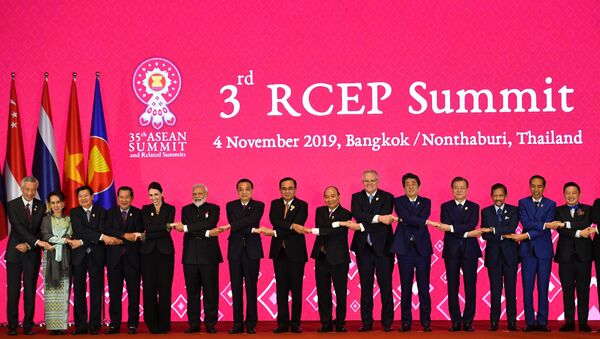Indian Commerce Minister Piyush Goyal has revealed in a briefing to ruling Bharatiya Janata Party’s parliamentarians that there was a “lot of pressure” from China to join the Regional Comprehensive Economic Partnership (RCEP). But India did not succumb to it.
Terming Prime Minister Narendra Modi’s RCEP decision an “economic victory for India”, the minister said: “…India did not succumb to pressure because of strong and able leadership.”
Beijing has yet to comment on the claims made by Goyal during the party’s parliamentary meeting in New Delhi on Tuesday.
On 4 November, India made a decision to stay out of the RCEP, saying that the proposed mega trade deal did not fully reflect "the basic spirit and the agreed guiding principles of the agreement."
"The RCEP does not address satisfactorily India's outstanding issues and concerns. In such as a situation, it is not possible for India to join the RCEP Agreement. Standing for greater regional integration, India has been pro-actively and constructively engaged in the RCEP negotiations since its inception. But during the last seven years, many things, including the global economic and trade scenarios, have changed," Prime Minister Modi said at the time.
He emphasised that the decision was made with respect to the interests of all Indians with an eye to addressing farmers concerns over India signing the trade pact.
"Our farmers and traders have stakes in such decisions. Equally important are the workers and consumers. When I measure the RCEP agreement with respect to the interests of all Indians, I do not get a positive answer. Therefore, my conscience does not permit me to join the RCEP," Modi added.
India, whose trade deficit with China amounts to $53 billion, has been seeking open market access for Indian goods in the neighbouring country and a safety mechanism against an import surge from China.
After India's withdrawal, the grouping now includes 10 members of the Association of South East Asian Nations (ASEAN) plus China, New Zealand, Japan, Australia and South Korea.
The RCEP negotiators hope to sign the deal in 2020 with the new tariff regime kicking in from 2022. The 15 countries involved account for half the world’s population and 32.2 percent of global Gross Domestic Product, equivalent to $22.6 trillion.


